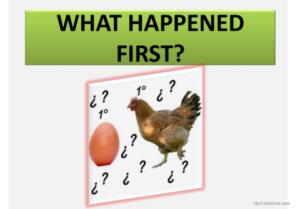Welcome back, English learners! In this sixth and final instalment of our blog series, we’re diving into two tenses that often confuse learners: Simple Past and Past Perfect Simple. Both are used to talk about the past, but they do so in different ways. Understanding when to use each will help you tell stories, share experiences, and avoid accidentally creating time-travel paradoxes in your sentences.
Let’s explore how they work, the differences between them, and common pitfalls to avoid.
Simple Past: The Everyday Storyteller
The Simple Past is your best friend when talking about completed actions or events in the past. It’s straightforward and focuses on what happened.
How to Form the Simple Past
- For regular verbs: Add -ed to the base verb:
- “work” → “worked”
- “play” → “played”
- For irregular verbs: Use the specific past form (sorry, you just have to memorize these):
- “go” → “went”
- “eat” → “ate”
When to Use It
- Completed Actions in the Past:
- “I watched a movie last night.”
- “She visited London last summer.”
- Actions Happening in Sequence:
- “I woke up, brushed my teeth, and went to work.”
- Specific Time References:
- “We met in 2010.”
- “He left at 8 PM.”
Common Mistakes
- Forgetting to match the verb with the tense:
- Wrong: “She go to the store yesterday.”
- Right: “She went to the store yesterday.”
Past Perfect Simple: The Flashback Expert
The Past Perfect Simple is your go-to tense for actions that were completed before another action or point in the past. Think of it as the “backstory” tense—it helps clarify the order of events.
How to Form the Past Perfect Simple
- Use had + past participle:
- “I had eaten.”
- “They had finished.”
When to Use It
- Actions Completed Before Another Past Action:
- “By the time I arrived, they had already left.”
(First action: They left. Second action: I arrived.)
- “By the time I arrived, they had already left.”
- Actions Completed Before a Specific Time in the Past:
- “She had finished her homework before 8 PM.”
- Clarifying the Sequence of Events:
- “He realized he had forgotten his keys.”
(The forgetting happened before the realizing.)
- “He realized he had forgotten his keys.”
Common Mistakes
- Using Past Perfect Simple when it’s unnecessary:
- Wrong: “I had watched that movie yesterday.”
- Right: “I watched that movie yesterday.” (Use Simple Past because there’s no second action to compare.)
- Forgetting to use “had” before the past participle:
- Wrong: “She finished her homework before I came.”
- Right: “She had finished her homework before I came.”
How They Compare
| Situation | Simple Past | Past Perfect Simple |
|---|---|---|
| Completed action | “I went to the store.” | — |
| Action completed before another past action | — | “I had already left when she called.” |
| Sequence of events | “He ate dinner and then went to bed.” | “He went to bed after he had eaten dinner.” |
Key Differences
- Timing:
- Use Simple Past for events that happened at a specific time in the past.
- Use Past Perfect Simple when an action happened before another past event.
- Clarity:
- Simple Past works when the sequence of events is clear from context.
- “I finished my work and went out for a walk.”
- Past Perfect Simple is essential when the order needs clarification.
- “I went out for a walk after I had finished my work.”
- Simple Past works when the sequence of events is clear from context.
Exercise: Test Your Knowledge
Choose the correct tense (Simple Past or Past Perfect Simple) for each sentence:
- By the time I _______ (arrive), they _______ (leave).
- She _______ (study) for hours before the exam began.
- He _______ (eat) breakfast, and then he _______ (go) to work.
- They _______ (finish) their project yesterday.
- I _______ (not/see) the movie until I _______ (read) the book.
- When we _______ (get) to the station, the train _______ (already/leave).
- She _______ (never/try) sushi before her trip to Japan.
- He _______ (break) his leg while he _______ (play) football.
- I _______ (forget) my umbrella, so I _______ (get) wet.
- After the guests _______ (leave), we _______ (clean) the house.
Answers
- arrived, had left
- had studied
- had eaten, went
- finished
- didn’t see, had read
- got, had already left
- had never tried
- broke, was playing
- had forgotten, got
- had left, cleaned
Final Tips
- Use Simple Past for actions that happen at a specific time in the past or in sequence.
- Use Past Perfect Simple to make the timeline of past events crystal clear.
With practice, these tenses will feel like second nature. Soon, you’ll be narrating past events like a storytelling master, weaving flashbacks into your tales with ease. Keep practicing—you’re doing great! 🌟
If you have enjoyed reading this blog, please ‘like’ it and share it with your friends and colleagues, and if you know anyone who might be interested in my online one-to-one lessons, please do ask them to contact me to discuss how I can help them to excel in English.


Recent Comments